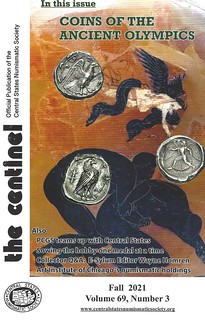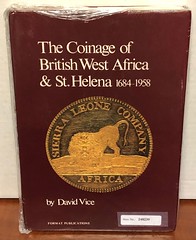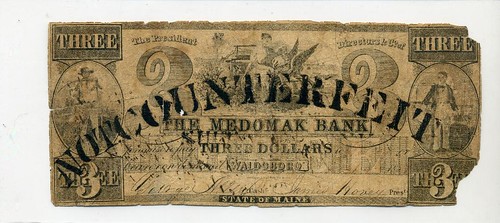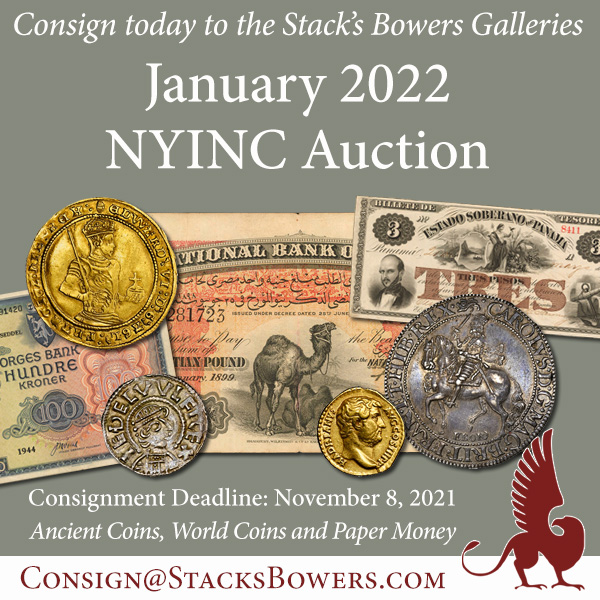
PREV ARTICLE
NEXT ARTICLE
FULL ISSUE
PREV FULL ISSUE
NOTES FROM E-SYLUM READERS: OCTOBER 10, 2021
On Changing the World of Numismatics
"The respondents and contributors to The E-Sylum express very vividly their interest in the work you initiated. "Personally, I believe the hobby is moving to be more digital. I think the ANA in particular, should position itself as a leader. Auctions are becoming digital, buying and selling coins and paper money are becoming digital. One can examine a coin or piece of paper money if posted digitally. I look at my two young grandsons, ages 9 and 5, who are computer savvy. I kid that if I have a problem with the TV, I call on the nine year old. Both boys are being home schooled this year due to COVID, but are involved in certified, online classes. Having a mother with a Yale Ph.D is a tremendous asset in their education. But the point is, lacking social interaction, the digital world allows the boys to succeed and possibly be ahead of their classmates. "The Newman Portal is itself changing the world of numismatics. "Congratulations for serving the numismatic community for 25 years, A sincere thank you from me for The E-Sylum."
To read the earlier E-Sylum article, see:
More on Fake Money and Fake Products "Here's a story I picked up years ago and have often used in talks or conversations." A farmer in China planted seeds for a major harvest. Nothing grew. The farmer then dug up the seeds and found they were counterfeit. He drank a bottle of pesticide. Later that day, his family found him lying in the field. He confessed his wish to die. The family rushed him to the hospital. The doctors, after an examination, found that the farmer had drunk a counterfeit pesticide that was harmless. Returning home, the family stopped and bought a bottle of Mai Tai. They were all found dead in their home. The Mai Tai was counterfeit and poisonous. (Peter Lowe, UK) True or not, it's a great story. Beware counterfeits! -Editor
To read the earlier E-Sylum article, see:
The Journal of East Asian Studies "I have the full run and have checked all for Woodward articles - there are several. The most similar to Jim's request is the V4#1 but the Woodward article is: "Shanghai Token Issues" 4 pages, no illustrations. I can send scans if needed." Thanks! -Editor
To read the earlier E-Sylum article, see:
Query: David Vice Contact Sought "I read an interesting article by numismatic researcher David Vice on the King's Norton Mint in Birminham and I need to ask him a question regarding these coins. He is the author of The Coinage of British West Africa & St. Helena, 1684-1958 " Can anyone help Kavan get in touch? Thanks. -Editor
The Most Not Counterfeit Note Ever "Starting in the mid 1800s the Suffolk Bank in Boston acted as a banknote clearing house for the many New England state or private banks. Their sometimes overbearing system was applauded by some and detested by others! The Federal Reserve System we have today, it is said, in many ways closely resembles the system used by the Suffolk Bank. The hundreds of state banks in business at the time throughout the New England States were subject to some banknote oversight by the Suffolk. Counterfeit bank notes permeated the industry and had to be removed as efficiently as possible. If someone even inadvertently, presented a counterfeit, raised or spurious note to a teller at the Suffolk that note would quickly be given a stamp exclaiming that the note presented was "counterfeit" and then returned to the owner. Not to be "bested" by the bank, it looks like the holder of this note devised a plan to be able to keep his note in circulation by adding a prefix to the stamp on the bill. Steve Noyes of Massachusetts, the current owner of this bill asked me if I thought anyone actually believed the new "imprimatur" affixed to his note." Thanks. I can't not never say I've seen a not-counterfeit note like this before! Or not... -Editor
Wayne Homren, Editor The Numismatic Bibliomania Society is a non-profit organization promoting numismatic literature. See our web site at coinbooks.org. To submit items for publication in The E-Sylum, write to the Editor at this address: whomren@gmail.com To subscribe go to: https://my.binhost.com/lists/listinfo/esylum All Rights Reserved. NBS Home Page Contact the NBS webmaster 
|



